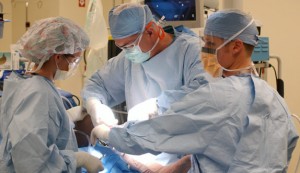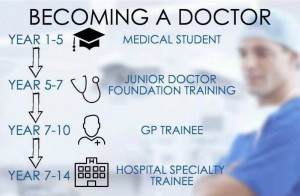There will be 1500 more medical school positions made available by 2018, in accordance with the new plan for England to become more sufficient in educating doctors.
After the latest statement from Jeremy Hunt to the Conservative party conference in Birmingham, NHS needs to become more “self-sufficient” when training doctors.
Statistically, a large number of doctors in the UK come from overseas – while the majority of British doctors choose to work in poorer countries which are need.
After Brexit, the position of the international doctors might be affected – since some of them might choose to leave the country and it will also be harder to recruit doctors from overseas.
By 2018, the positions for medical students will rise up to 25%, in order to get more people to choose England as the country to study medicine.
The government believes that by increasing the numbers of medical students in England will have a great effect in the following years.
Stephanos Ghobrial, 21, is an international student, studying in a medical school in England. He believes that the NHS needs to make a lot of improvements in order to get more junior doctors to choose to stay and work in England.
He said: “I became a doctor because I wanted to help people by making use of my abilities in science related subjects and I also wanted to join a more competitive course.”
The change will become visible by 2024 when the first graduates of this new suggestion will start working for the NHS.
The training places will cost approximately £100m from 2018, but it is expected that the government will get this money back, by charging international students more than now.
“The number of applications per place in the UK is around 10-12 every year on average at every university. An increase in places will without a doubt increase the applications and more English people will decide to stay in the UK.”
Ghobrial also added: “During the past 2 years the number of applicants has been in decline and the level of students applying is decreased, I believe such a change may raise the bar higher again.”
Even though a lot of doctors working in the UK are international, the UK universities accept a much greater percentage of UK students compared to abroad. Most medical graduates have a secured job in the NHS (99% within the first 6 months)
Ghobrial believes that “Brexit will not greatly affect the medical system. This being said, we have to bear in mind that a great percentage of UK and/or international student go abroad anyway straight after their studies, searching for a residency which pays more and has fewer hours and pressure.
“I will most likely spend some years in the UK to get registered with the GMC. I don’t, however, believe that I will spend more than 4-5 years. In the near future after I graduate I aim to either return back home to work or I may continue my residency abroad in the US or Canada where junior doctors are much more highly regarded.”
He added: “The universities are not obliged to accept less bright students from abroad instead of local students but there can always be a fair balance between the two.”
The way this new scheme will work is yet to be sorted out, however the students will be expected to work for the NHS for at least four years. The plan will also have to be worked out concerning doctors moving to other parts of the UK.
Ghobrial however, says “from a patient’s perspective, even though the NHS is free at point of service, the waiting lists are long and this leads to reduction in welfare of the whole population. I believe that is partly the reason why medical school places are increasing,
“I am hoping that in the near future, the doctors can have less busy timetables and more acceptable hours so that they can happily and efficiently do the best of their abilities during working hours.”

















Recent Comments